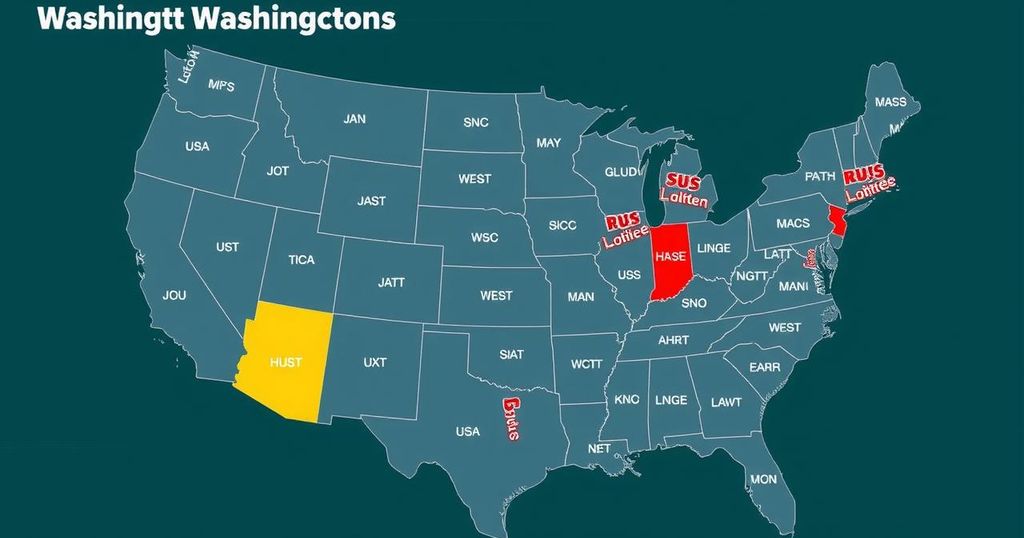Election Day in Washington: Undercurrents of National Anxiety Overshadow Local Elections

Voters in Washington State are largely focused on the presidential election between Kamala Harris and Donald Trump, overshadowing the local elections and initiatives that are also at stake. Concerns about Trump’s rhetoric and policies dominate voter sentiment, although significant local issues remain. Candidates tailor their messages to this environment, illustrating the complex interplay between local and national politics and the anxiety felt by voters leading up to Election Day.
As Washington State approaches Election Day, voters find themselves primarily fixated on the presidential contest between Vice President Kamala Harris and former President Donald Trump, despite the historic elections of local offices and initiatives. Specifically, Washington will elect a new governor—a position that remains unfilled for twelve years—along with a new attorney general and potentially several new members of Congress. Furthermore, voters will determine the fate of statewide initiatives concerning tax policies and climate agendas. However, interviews with voters reveal that local races are often overshadowed by the overarching presidential race, which is largely being contested in select states outside the Pacific Northwest. Concerns regarding the presidential race are palpable among local constituents, with many expressing anxiety over the potential re-election of Mr. Trump, whose rhetoric and policies they find profoundly unsettling. David Phillips, a public health researcher, articulated this sentiment of dread, stating, “This is terrifying, terrifying rhetoric” – Source. Local candidates have adapted their campaigns to address these concerns, using the presidential race as a backdrop to draw attention to their own platforms. In particular, Bob Ferguson, the Democratic candidate for governor, is framing his campaign against his Republican opponent, Dave Reichert, by associating him with Trump in contrasting advertisements. This local strategy suggests that while voters may feel overwhelmed by the national contest, it nonetheless heavily influences their views on local candidates. Voting in Washington reflects a complex landscape where many individuals, irrespective of party affiliation, recognize the weight of the presidential outcomes on their lives. Sandy Robinson, a retired educator, expressed her unease about rising crime and the economy, focusing narrowly on the presidential race amidst broader concerns. She noted, “I just went ahead and voted for Harris because I think she’s maybe just the lesser of the two evils” – Source. Similarly, the voters’ motivations extend beyond mere party allegiance to include instincts for safety, economic stability, and social issues, with many residents articulating a desire for a conducive environment for their families. This multifaceted approach to voting encapsulates the intricacies of perspectives, even among demographics typically seen as homogeneous. As early voting approaches its conclusion, a significant portion of registered voters in Washington has already cast their ballots, suggesting a varying degree of engagement relative to previous election cycles. In essence, while Washington voters are challenged to make critical decisions in various local contests, their attention remains predominantly captured by the national spectacle of the presidential race, which they believe to have substantial implications for broader societal issues. The compelling landscape of voter sentiment underscores a state grappling with complex feelings of apprehension and hope regarding both local and national leadership. While issues of local governance and initiatives hold intrinsic significance, they appear eclipsed by the looming presidency race, weaving a narrative of anxiety that pervades electoral discussions leading to Election Day. Ultimately, the intertwining of local and national politics illustrates the multifaceted nature of voter priorities, encapsulating aspirations and concerns that transcend regional boundaries as Washington prepares for a transformational electoral season. In conclusion, the findings suggest that Washington voters, while engaged in pivotal local races, remain significantly preoccupied by the presidential contest, with myriad implications for the state’s political landscape and community engagement.
The article focuses on Washington State’s upcoming elections, wherein significant local offices and issues are at stake, yet voter attention remains largely directed towards the presidential race between Kamala Harris and Donald Trump. As voters prioritize the higher profile national contest, local races struggle for visibility despite their impacts on daily governance and policy. This situation presents a unique challenge for candidates in local races, which are often overshadowed by the broader political drama unfolding at the national level. The intertwining of local and national concerns reflects ongoing anxieties present in voter sentiment and the political climate leading to Election Day.
In summary, the preoccupation of Washington voters with the presidential race significantly impacts their engagement with local elections and initiatives. While the state will witness important local elections, the focus remains predominantly on the national political landscape, as concerns over the implications of the presidential contest take precedence. This dynamic not only highlights the relationship between local and national politics but also illustrates a deep-seated anxiety among voters regarding the future, necessitating a thorough understanding of the evolving political environment in Washington State as Election Day approaches.
Original Source: www.seattletimes.com






